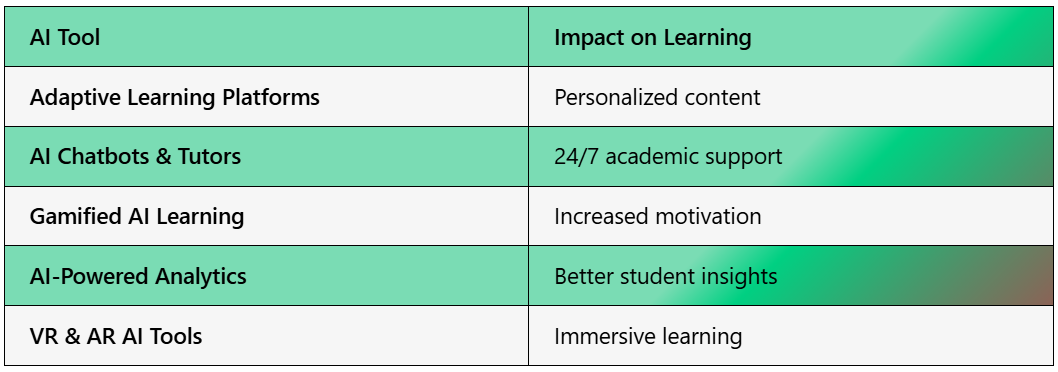
The Role of Artificial Intelligence and the Future of Teaching is rapidly growing as we enter the digital age. Picture a classroom where personalized learning is standard. With AI, teachers can customize lessons to fit each student’s unique needs, ensuring no one is overlooked. This technology enhances the educational experience for both students and educators, rather than merely automating tasks.
A standout feature of AI in education is its capacity for real-time feedback. For example, platforms like Carnegie Learning utilize AI to evaluate student performance and adjust lessons accordingly. If a student struggles with a concept, the system can provide additional resources or alternative explanations. Here are some key benefits of integrating AI into education:
- Personalized Learning: Adapts to individual learning styles and paces.
- Efficiency: Automates administrative tasks, allowing teachers to focus on teaching.
- Accessibility: Offers tailored support for students with disabilities.
- Engagement: Makes learning more interactive and enjoyable.
Looking ahead, AI will play a crucial role in education. Students can use AI tools like chatbots for homework assistance or educational apps to enhance their learning experience. With AI leading the way, the future of education technology promises a more inclusive and effective learning environment for everyone.
Unlock your potential with online degrees—Learn more!
How AI Personalizes Learning Experiences for Students
Artificial Intelligence is transforming education by personalizing learning experiences for students. Imagine a classroom where each student benefits from a tailored approach that adapts to their unique needs and pace. This is becoming a reality with AI technologies that analyze student performance data to identify strengths and weaknesses, enabling educators to provide targeted support.
For example, platforms like DreamBox Learning utilize AI to adjust math lessons in real-time, ensuring students fully grasp concepts before progressing. Students can leverage AI in several ways:
- Personalized Learning Plans: AI creates customized study plans based on individual learning styles, allowing students to focus on areas needing improvement while advancing in subjects they excel in.
- Instant Feedback: AI tools provide immediate feedback on assignments and quizzes, helping students learn from their mistakes right away.
- Enhanced Engagement: AI-driven educational games and simulations make learning interactive and enjoyable, keeping students motivated.
Looking ahead, AI will play a crucial role in shaping education. By personalizing learning experiences, AI enhances academic performance and fosters a love for learning, creating a more inclusive and effective educational environment for all students. The future of teaching is indeed bright with these advancements.
Transforming Classroom Dynamics with AI Technology
The future of education is being transformed by Artificial Intelligence, which is set to revolutionize teaching and learning. Picture a classroom where personalized learning experiences are standard. AI technology can analyze student performance in real-time, enabling educators to customize their teaching methods to cater to diverse learning needs.
This transformation enhances student engagement and fosters an inclusive environment for all learners. Students can leverage AI in various school activities. For example, AI-powered tools can streamline research, helping students quickly find relevant information. Language processing applications can also assist with writing assignments by suggesting grammar and style improvements. Key benefits of integrating AI into the classroom include:
- Personalized learning experiences tailored to each student’s pace.
- Increased engagement through interactive tools.
- More efficient administrative tasks, allowing teachers to focus on instruction.
- Enhanced accessibility for students with disabilities through customized resources.
Looking ahead, the future of education technology is promising, with AI at the forefront. Schools are beginning to adopt AI-driven platforms that support both teachers and students. By embracing these innovations, educators can create dynamic learning environments that prepare students for future challenges, making education more relevant and impactful.
The Future of Teaching: AI-Driven Curriculum Development
The Future of Teaching: AI-Driven Curriculum Development is set to transform how educators approach learning. Imagine a classroom where lessons are customized to fit each student’s unique learning style and pace. With Artificial Intelligence, teachers can leverage data to create personalized learning experiences that enhance engagement and deepen understanding of the material.
A major advantage of AI in education is its capacity to quickly analyze vast amounts of data. Platforms like DreamBox Learning and Knewton utilize AI algorithms to assess student performance in real-time, enabling educators to pinpoint areas of struggle and adjust the curriculum accordingly. Here are some key insights on how AI can reshape teaching:
- Personalized Learning: AI adapts lessons based on student progress.
- Efficient Assessment: Automated grading saves time and provides instant feedback.
- Resource Optimization: AI recommends supplementary materials tailored to student needs.
Looking ahead, students will also harness AI in school. Tools like chatbots and virtual tutors can assist with homework and offer support outside the classroom. By embracing these technologies, students can take control of their learning journey, making education more interactive and engaging. The integration of AI in future education technology is a transformative shift that will redefine knowledge acquisition.
Enhancing Teacher Efficiency through AI Tools
As we enter a new era of education, the integration of Artificial Intelligence is transforming how teachers operate in the classroom. AI tools are not just assisting educators with lesson planning; they are also providing personalized learning experiences for students. This shift is enhancing teacher efficiency in significant ways.
One major benefit of AI in education is its ability to automate administrative tasks. Teachers often feel overwhelmed with grading, scheduling, and paperwork. AI can streamline these tasks, allowing educators to focus more on teaching and engaging with students. Here are some key advantages of using AI in the classroom:
- Time-saving: AI handles repetitive tasks, freeing up valuable time for teachers.
- Personalization: AI analyzes student performance and tailors learning materials to meet individual needs.
- Data-driven insights: Educators gain insights into student progress, enabling targeted interventions.
Looking ahead, AI will play a crucial role in shaping educational experiences. Students can also leverage AI tools for research, homework assistance, and language learning. By embracing these technologies, both teachers and students can foster a more dynamic and effective learning environment, paving the way for a brighter educational future.

AI and Student Engagement: A New Era of Learning
The integration of Artificial Intelligence in education is revolutionizing student engagement. Picture a classroom where AI tools personalize learning experiences, adapting to each student’s unique needs and pace. This transformation enhances understanding and fosters a deeper connection to the material. For example, platforms like Khan Academy use AI to provide tailored exercises, ensuring students master concepts before advancing to more complex topics. The benefits of AI in student engagement are significant:
- Personalized Learning: AI analyzes student performance and suggests resources that align with their learning styles.
- Instant Feedback: AI-driven assessments offer immediate feedback, enabling students to correct mistakes and reinforce learning in real-time.
- Enhanced Collaboration: AI tools facilitate group projects by connecting students with similar interests, promoting teamwork and communication.
- Accessibility: AI breaks down barriers for students with disabilities, providing tailored support to meet their needs.
Looking to the future, education technology is promising. Students can utilize AI for various purposes, such as chatbots for homework assistance or AI-driven apps to improve study habits. As educators adopt these tools, classrooms will evolve into dynamic environments where learning is about engaging with knowledge meaningfully, preparing students for the future and igniting a passion for lifelong learning.
Predictive Analytics: Shaping Educational Outcomes with AI
Predictive analytics is transforming education by providing unprecedented insights into student performance. By utilizing artificial intelligence, educators can analyze extensive data to identify trends and patterns, allowing for tailored educational experiences and the ability to predict future outcomes.
Imagine a classroom where teachers can anticipate which students may struggle and intervene proactively—this is becoming a reality with AI. One of the most compelling features of predictive analytics is its capacity to personalize learning. Key benefits include:
- Early Intervention: Timely support for students at risk of falling behind.
- Customized Learning Paths: AI suggests resources tailored to individual learning styles.
- Enhanced Engagement: Educators can create more relevant content by understanding student motivations.
- Data-Driven Decisions: Schools can make informed choices about curriculum and resource allocation based on real-time data. Looking ahead, AI will be crucial in education technology.
Students can use AI-driven platforms for research, homework help, and collaborative projects. This integration not only enhances learning but also prepares students for a technology-driven workforce. By adopting predictive analytics, we are shaping educational outcomes and fostering a more informed and capable generation of learners.
Unlock your potential with online degrees—Learn more!
Ethical Considerations in AI-Enhanced Teaching
As we explore the future of education, the ethical implications of integrating Artificial Intelligence into teaching become crucial. While AI enhances learning experiences, it raises concerns about privacy, bias, and the role of educators.
For example, AI tools can analyze student performance and provide personalized feedback, but how can we ensure responsible data use? Schools need clear guidelines to protect student information and maintain transparency with parents and guardians. A significant advantage of AI in education is its ability to cater to diverse learning styles. Picture a classroom where each student receives tailored resources based on their unique needs.
However, this customization requires careful implementation. Educators must be trained to understand AI tools and their limitations to guide students effectively. Here are key considerations for ethical AI use in teaching:
- Data Privacy: Ensure student data is secure and used solely for educational purposes.
- Bias Mitigation: Regularly assess AI systems to prevent biased outcomes that could disadvantage certain groups.
- Teacher Empowerment: Equip educators with the knowledge to leverage AI while preserving their essential role in the classroom.
- Student Agency: Encourage students to engage critically with AI tools, fostering a sense of responsibility in their learning journey.
Preparing Educators for an AI-Integrated Classroom
As we enter a new era of education, preparing educators for an AI-integrated classroom is essential. Artificial intelligence is revolutionizing teaching and learning. Picture a classroom where teachers utilize AI tools to analyze student performance in real-time, enabling them to customize their teaching methods to individual needs. This transformation enhances the learning experience and allows educators to focus on inspiring and engaging students.
To successfully integrate AI, educators should adopt key strategies. They need to become familiar with AI tools that assist in lesson planning and grading. Platforms like Google Classroom and Microsoft Teams now feature AI capabilities that simplify administrative tasks. Professional development programs focused on AI literacy can also equip teachers with the necessary skills. Benefits of AI in education include:
- Personalized learning experiences
- Increased engagement through interactive tools
- Streamlined administrative processes
- Data-driven insights for teaching strategies.
Students can also leverage AI to improve their learning. Tools such as chatbots and virtual tutors offer instant support, helping them understand complex concepts. Looking ahead, AI will significantly influence how students learn and interact with information. By preparing educators for this shift, we enhance teaching methods and create a more dynamic educational landscape.
The Impact of AI on Lifelong Learning and Professional Development
As we enter a new era of education, the influence of AI on lifelong learning and professional development is becoming increasingly clear. Picture a classroom where personalized learning experiences are standard, thanks to artificial intelligence. This technology is not just a concept for the future; it is actively transforming how students learn and how educators teach.
With AI tools, students receive tailored feedback and resources that align with their unique learning styles, enhancing the effectiveness and engagement of education. One of the most exciting aspects of AI in education is its ability to support continuous learning. Key benefits of integrating AI into lifelong learning include:
- Personalized Learning: AI analyzes student performance and adapts lessons accordingly.
- Accessibility: AI tools help remove barriers for students with disabilities, ensuring equal access to education.
- Real-Time Feedback: Students receive instant feedback on their work, promoting continuous improvement.
- Resource Optimization: Educators can identify effective teaching methods and materials using AI, improving overall learning outcomes.
Additionally, students can utilize AI in school to enhance their learning experiences. For example, AI-powered tutoring systems offer extra support outside the classroom, helping students grasp complex concepts and encouraging self-directed learning. As we look to the future of education technology, it is evident that AI will play a crucial role in shaping how we learn, teach, and develop professionally. Embracing these advancements is essential for both educators and students to meet tomorrow’s challenges.
Unlock your potential with online degrees—Learn more!
FAQs
-
What does the future of AI in teaching look like?
The future will likely include AI-powered virtual tutors, more adaptive learning platforms, and data-driven teaching improvements, but human teachers will remain central to education. -
How will AI impact higher education and professional training?
AI will enhance online learning, provide real-time skill assessments, and offer personalized career guidance for students. -
How can educators ensure AI is used responsibly?
Teachers should focus on ethical AI usage, educate students about AI literacy, and advocate for policies that protect student data and ensure fairness.





